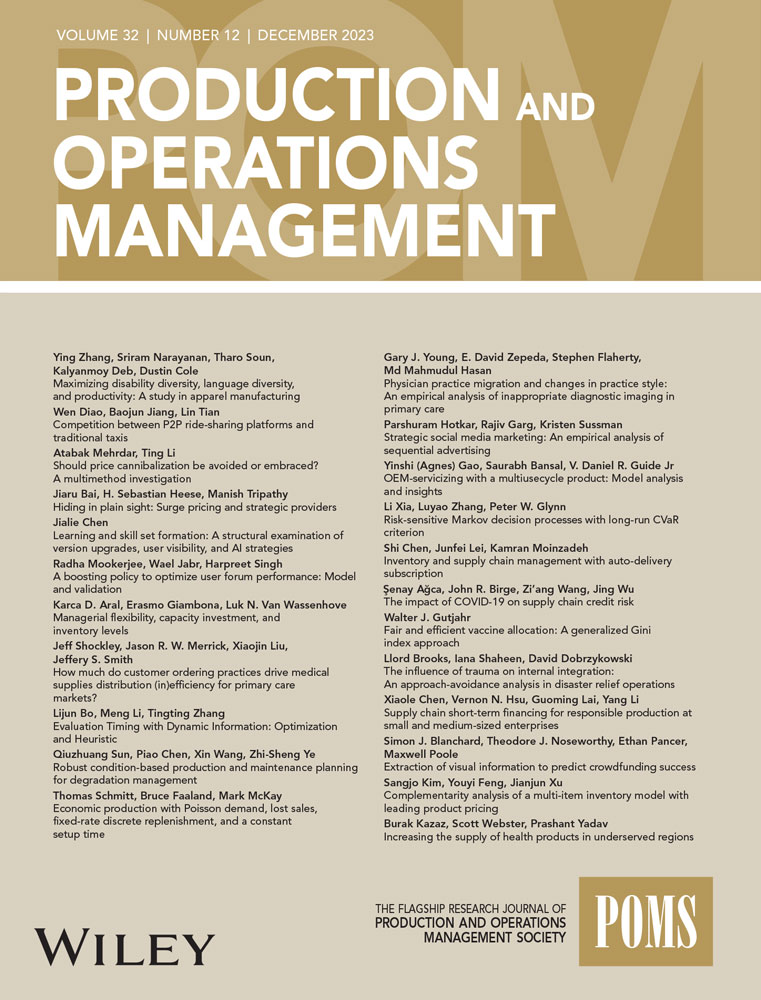罗宾汉的救援:数据合作社的可持续收入分配方案
IF 5.1
3区 管理学
Q1 ENGINEERING, MANUFACTURING
引用次数: 0
摘要
随着信息技术的进步,消费者数据的前景刺激了创新,不仅在公司开展业务的方式上,而且在数据收集的方式上。最近出现的一个突出的制度结构是数据合作社——一个从其成员那里收集数据,并对汇集的数据进行处理和货币化的组织。消费者数据的一个特征是它产生的外部性:个人共享的数据揭示了其他类似个人的信息;因此,汇集数据的边际值在数据的数量和质量上都有所增加。数据合作社面临的一个关键挑战是与成员分享收入的收入分配方案的设计。一个有效的方案会产生一个有益的循环:它激励成员共享高质量的数据,这反过来又会产生高质量的汇集数据——这增加了数据对买家的吸引力,从而增加了合作社的收入,最终导致成员的补偿得到改善。虽然合作社自然希望最大化其总盈余,但分配方案的另外两个重要的理想属性是个体合理性和联盟稳定性。我们首先研究了一种自然比例分配方案——根据成员的个人贡献支付成员——并表明,当成员的隐私成本是均匀的时,它同时实现了个人理性、第一-最佳结果和联盟稳定性。在隐私成本存在异质性的情况下,本文分析了一种新的混合分配方案,结果表明该方案既能实现个体理性,又能实现第一最优结果,但可能不满足联盟稳定性。最后,我们的罗宾汉分配方案——使用一小部分收入来确保联盟的稳定性,并根据混合方案分配剩余的收入——实现了所有理想的特性。本文章由计算机程序翻译,如有差异,请以英文原文为准。
Robin Hood to the Rescue: Sustainable Revenue‐Allocation Schemes for Data Cooperatives
Abstract The promise of consumer data along with advances in information technology has spurred innovation not only in the way firms conduct their business operations but also in the manner in which data are collected. A prominent institutional structure that has recently emerged is a data cooperative —an organization that collects data from its members, and processes and monetizes the pooled data. A characteristic of consumer data is the externality it generates: Data shared by an individual reveal information about other similar individuals; thus, the marginal value of pooled data increases in both the quantity and quality of the data. A key challenge faced by a data cooperative is the design of a revenue‐allocation scheme for sharing revenue with its members. An effective scheme generates a beneficial cycle: It incentivizes members to share high‐quality data, which in turn results in high‐quality pooled data—this increases the attractiveness of the data for buyers and hence the cooperative's revenue, ultimately resulting in improved compensation for the members. While the cooperative naturally wishes to maximize its total surplus, two other important desirable properties of an allocation scheme are individual rationality and coalitional stability. We first examine a natural proportional allocation scheme —which pays members based on their individual contribution—and show that it simultaneously achieves individual rationality, the first‐best outcome, and coalitional stability, when members' privacy costs are homogeneous. Under heterogeneity in privacy costs, we analyze a novel hybrid allocation scheme and show that it achieves both individual rationality and the first‐best outcome, but may not satisfy coalitional stability. Finally, our RobinHood allocation scheme —which uses a fraction of the revenue to ensure coalitional stability and allocates the remaining based on the hybrid scheme—achieves all the desirable properties.
求助全文
通过发布文献求助,成功后即可免费获取论文全文。
去求助
来源期刊

Production and Operations Management
管理科学-工程:制造
CiteScore
7.50
自引率
16.00%
发文量
278
审稿时长
24 months
期刊介绍:
The mission of Production and Operations Management is to serve as the flagship research journal in operations management in manufacturing and services. The journal publishes scientific research into the problems, interest, and concerns of managers who manage product and process design, operations, and supply chains. It covers all topics in product and process design, operations, and supply chain management and welcomes papers using any research paradigm.
 求助内容:
求助内容: 应助结果提醒方式:
应助结果提醒方式:


